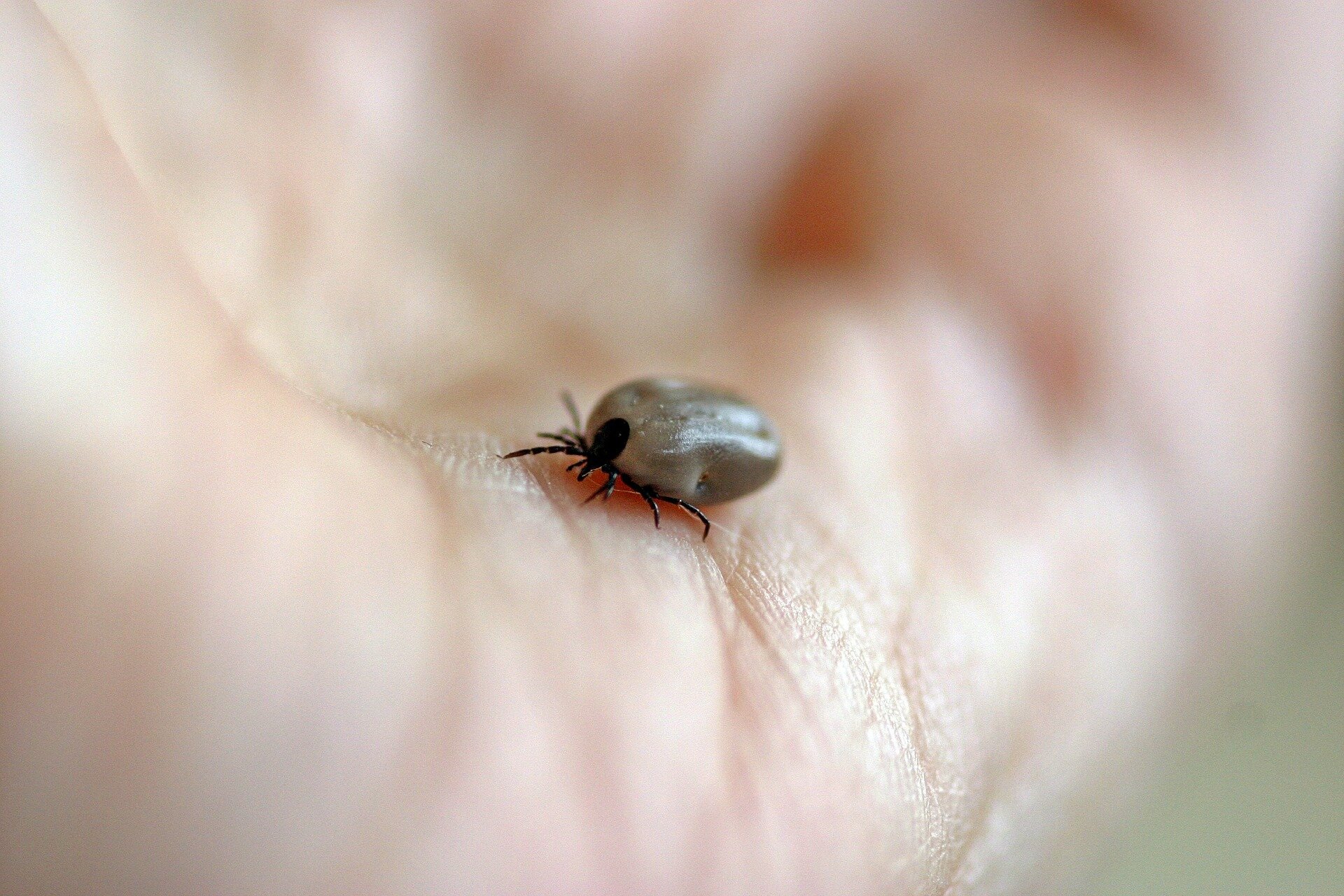
Sign in with <a href="https://sciencex.com/profile/sm-login-redirect/fb/" class="login-link" referrerpolicy="unsafe-url"> <svg> <use href="https://medx.b-cdn.net/tmpl/v6/img/svg/sprite.svg#logo_fb" x="0" y="0" /> </svg> </a> <a href="https://sciencex.com/profile/sm-login-redirect/google/" class="login-link" referrerpolicy="unsafe-url"> <svg> <use href="https://medx.b-cdn.net/tmpl/v6/img/svg/sprite.svg#logo_google" x="0" y="0" /> </svg> </a> <a href="https://sciencex.com/profile/sm-login-redirect/apple/" class="login-link" referrerpolicy="unsafe-url"> <svg> <use href="https://medx.b-cdn.net/tmpl/v6/img/svg/sprite.svg#logo_apple" x="0" y="0" /> </svg> </a> <br> <a href="https://sciencex.com/profile/pwdreset/">Forget Password?</a> <br> <a class="font-weight-normal" href="https://sciencex.com/help/account/">Learn more</a> <br>share this!<br>1<br>1<br>Share<br>Email<br> March 9, 2021 <br> by Bay Area Lyme Foundation <br>Bay Area Lyme Foundation, a leading sponsor of Lyme disease research in the U.S., today announced the publication of new data finding that five herbal medicines had potent activity compared to commonly-used antibiotics in test tubes against Babesia duncani, a malaria-like parasite found on the West Coast of the U.S. that causes the disease babesiosis.<br>Published in the journal <i>Frontiers in Cellular and Infection Microbiology</i>, the <a href="https://medicalxpress.com/tags/laboratory+study/" rel="tag" class="textTag">laboratory study</a> was funded in part by the Bay Area Lyme Foundation. Collaborating researchers were from Johns Hopkins Bloomberg School of Public Health, California Center for Functional Medicine, and FOCUS Health Group, Naturopathic.<br>"This research is particularly important as babesiosis is a significant emerging health risk. Due to limited therapeutics and a rise in <a href="https://medicalxpress.com/tags/treatment+resistance/" rel="tag" class="textTag">treatment resistance</a>, current treatment options for this <a href="https://medicalxpress.com/tags/disease/" rel="tag" class="textTag">disease</a> are inadequate and many patients rely on herbal therapies for which there is only anecdotal evidence of efficacy," said co-author Sunjya K. Schweig, MD, Founder and Director, California Center for Functional Medicine and Scientific Advisory Board Member, Bay Area Lyme Foundation, who has also studied herbal treatments for Lyme disease.<br>"Increasingly, Americans with chronic diseases are pursuing complementary and alternative <a href="https://medicalxpress.com/tags/medicine/" rel="tag" class="textTag">medicine</a> to improve general health or quality of life. We hope this data offers inspiration to other researchers to further explore similar options for people living with persistent tick-borne diseases that do not respond to current treatments," added Dr. Schweig.<br>While current treatment protocols for babesiosis recommend use of antibiotics including atovaquone, azithromycin, clindamycin, quinine, and their combinations, these regimens are often associated with treatment failures and significant side effects, even in immunocompetent patients. In addition, <a href="https://medicalxpress.com/tags/epidemiologic+studies/" rel="tag" class="textTag">epidemiologic studies</a> have documented that up to 23% of patients with babesiosis experienced concurrent Lyme disease and its associated disabling effects.<br>According to this laboratory study, the five <a href="https://medicalxpress.com/tags/herbal+medicines/" rel="tag" class="textTag">herbal medicines</a> that demonstrated inhibitory activity against B. duncani are:<br>Further, the study discovered that the <a href="https://medicalxpress.com/tags/bioactive+compounds/" rel="tag" class="textTag">bioactive compounds</a> derived from <i>Cryptolepis sanguinolenta</i>, <i>Artemisia annua</i>, and Scutellaria baicalensis, had comparable or even better activity against B. duncani than the commonly used antimicrobial medications quinine and clindamycin.<br>This is the first study to report the antibabesial activity of Scutellaria baicalensis. However, the antimicrobial and anti-inflammatory activity of <i>Alchornea cordifolia</i> and <i>Polygonum cuspidatum</i> extracts have been previously documented, and other studies have found benefits of combining agents such as compounds derived from <i>Cryptolepis sanguinolenta</i> and an artemisinin-based therapy.<br>These compounds still need to be tested both in vitro and in animal models as well as in <a href="https://medicalxpress.com/tags/clinical+trials/" rel="tag" class="textTag">clinical trials</a>. While each of these botanical medicines are already in clinical use, it is important for future studies to evaluate them directly in patients using specific clinical treatment regimens, as each have the potential to produce side effects in patients, and should be taken only under the care of a clinician knowledgeable of their capabilities and toxicities.<br>"Herbal medicines have been successfully used by various traditional medicine systems and ancient cultures," said Linda Giampa, executive director, Bay Area Lyme Foundation. "Coinfected tick-borne disease patients frequently experience a greater number of symptoms for a longer duration than those with Lyme disease alone, pointing to the need for novel treatments for babesiosis, one of the most common tick-borne infections after Lyme disease. We hope that findings from this study are an important step towards developing new therapeutic options for doctors and their patients with persistent Lyme disease and other tick-borne infections."<br><strong>More information:</strong> "Botanical medicines Cryptolepis sanguinolenta, Artemisia annua, Scutellaria baicalensis, Polygonum cuspidatum, and Alchornea cordifolia demonstrate inhibitory activity against Babesia duncani," <i>Frontiers in Cellular and Infection Microbiology</i>, 2021. <br>Explore further<br>Facebook<br>Twitter<br>Email<br> Feedback to editors<br>59 minutes ago<br><span>0</span><br>1 hour ago<br><span>0</span><br>21 hours ago<br><span>0</span><br>23 hours ago<br><span>0</span><br>Nov 8, 2025<br><span>1</span><br>59 minutes ago<br>1 hour ago<br>3 hours ago<br>3 hours ago<br>9 hours ago<br>13 hours ago<br>13 hours ago<br>13 hours ago<br>15 hours ago<br>15 hours ago<br>Feb 21, 2020<br>Dec 8, 2020<br>Dec 11, 2020<br>Jun 20, 2017<br>Aug 3, 2018<br>Jun 20, 2018<br>59 minutes ago<br>3 hours ago<br>21 hours ago<br>17 hours ago<br>19 hours ago<br>15 hours ago<br><br> <small> This summary was automatically generated using LLM. <a class="text-info" href="https://sciencex.com/help/ai-disclaimer/" target="_blank">Full disclaimer</a> </small> <br> Use this form if you have come across a typo, inaccuracy or would like to send an edit request for the content on this page. For general inquiries, please use our <a href="https://sciencex.com/help/feedback/" target="_blank">contact form</a>. For general feedback, use the public comments section below (please <a href="https://sciencex.com/help/comments/" target="_blank">adhere to guidelines</a>). <br>Please select the most appropriate category to facilitate processing of your request<br>Thank you for taking time to provide your feedback to the editors.<br>Your feedback is important to us. However, we do not guarantee individual replies due to the high volume of messages. <br> Your email address is used <strong>only</strong> to let the recipient know who sent the email. Neither your address nor the recipient's address will be used for any other purpose. The information you enter will appear in your e-mail message and is not retained by Medical Xpress in any form. <br><br> Get weekly and/or daily updates delivered to your inbox. You can unsubscribe at any time and we'll never share your details to third parties. <br> <a href="https://sciencex.com/help/newsletter/" class="popup-cookies-more pr-4" target="_blank">More information</a> <a href="https://sciencex.com/help/privacy/" class="popup-cookies-more" target="_blank">Privacy policy</a> <br> We keep our content available to everyone. Consider supporting Science X's mission by getting a premium account. <br>Daily science news on research developments and the latest scientific innovations<br>The latest engineering, electronics and technology advances<br> The most comprehensive sci-tech news coverage on the web<br><br><a href="https://news.google.com/rss/articles/CBMijwFBVV95cUxQbWdscmtvQi15MVJ3QU53T3dEalhrTWFJdnJKWmhmby1ybHJLU1hoNl9FRE1SZXA4VnExby1SS1hhSFpnT0x2LTRIMFg5LVI1c1lJWkZiUnhZdjlSd2dyakZPWVhRY255Ujk1b1EyU3poYXFZRUlMV0JqN2lSWmVOaTQwTDViYmljZ0tWQ3pmaw?oc=5">source</a>
Like this:
Like Loading...
Related

